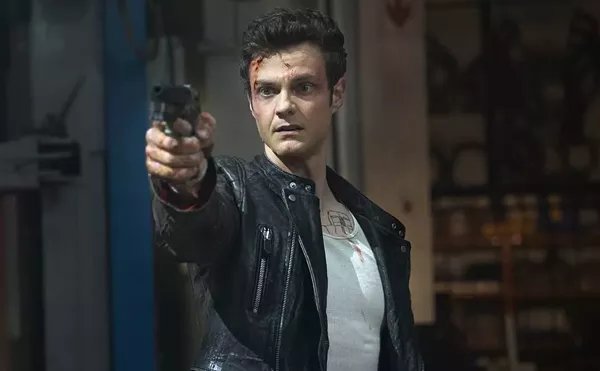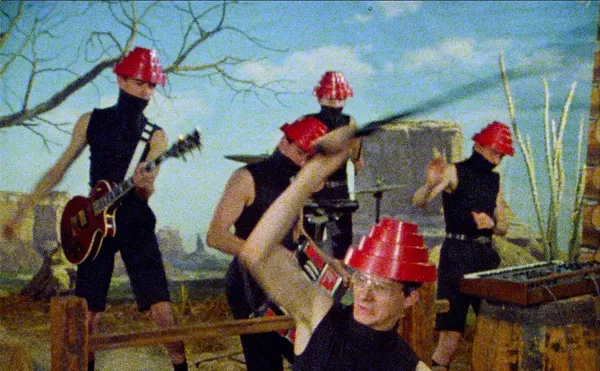You'd think a film giving away the outcome of its conflict in the title couldn't build suspense. But that's exactly what Kevin Rafferty's entertaining, no-frills documentary does. A generational anecdote that celebrates Ivy League folklore, Harvard Beats Yale 29-29 reels you into its 1968 football faceoff while spooning on a pile of cultural and political milestones between game reminiscences and archival footage.
The semi-legendary game pitted the undefeated Harvard Crimson against the undefeated Yale Bulldogs for the Ivy League championship. Yale, ranked 16th in the nation and heavily favored to win, not only boasted a celebrated coach and talented team, its quarterback, Brian Dowling, had never once lost a game. Considered a demigod among Yalies, Dowling was the inspiration for classmate Gary Trudeau's helmet-wearing B.D. in Doonesbury.
Harvard, on the other hand, was a team of do-it-yourselfers who, despite its players' different backgrounds and ineffectual coach, decided to take matters into its own hands and become a team to be reckoned with. Over the season Harvard ran up a string of decisive victories but few considered the team a real challenge.
And the first half of the game shows that; Yale systematically demolishes Harvard's vaunted defense, sending them into the halftime locker room trailing 22-0. When the Crimson switches quarterbacks in the second half, its luck changes and the team claws back a little dignity. Still, Yale dominates. What makes the game so astonishing is that until the final three minutes, Harvard trailed by 16 points. As the clock wound down, the Yale band taunted them by playing The Mickey Mouse Club theme while rival fans chanted, "You're number two! You're number two!" And then something miraculous happened — and we experience the game's outlandish finale as the former players recount a surprising cascade of failures, fate and triumph.
It's a simple and engaging sports memoir, and Rafferty's approach is appropriately minimalist, eschewing the postproduction gimmicks of modern documentaries for talking-head interviews set against the game's fixed-camera television broadcast. The play-by-play commentary of players (now in their 60s) from both teams reveals a fascinating backstory and surprising on-field dramatics. Rafferty also cleverly inserts period details like the advent of the birth-control pill, campus activism and the Vietnam War. It's intriguing to see how this crew of footballers sat at the intersection of popular and political culture, drawing Al Gore, Meryl Streep, Tommy Lee Jones (who was a Harvard point guard), George W. Bush and cartoonist Trudeau into their story. And yet, there's something about their Ivy League-boomer entitlement that's galling. Yes, the game was memorably exciting with dramatic twists and colorful recollections, but there's no getting around the fact these are mostly privileged white guys trying to find profundity in an upper-crust college rivalry. Jones, in particular, comes off as pompous and self-important, quoting Dickens to describe the times. Rafferty tries to ground his story by including a 24-year-old Vietnam vet and a couple of working-class Harvard students, but, truth is, there are no significant cultural differences between the men. You are essentially looking at America's ruling class.
And unlike Trudeau's Doonesbury, which so brilliantly skewered blue-blood hubris, Rafferty, a Harvard grad, reveals himself to be just another member of the self-referential elite, unable or unwilling to bring a deeper or broader context to the time and circumstances of the game. This is made troublingly clear by black Yale alumni (and football hall-of-famer) Calvin Hill's glaring absence from the film. Not only was Hill a critical player in the game, it also established him as the highest scorer in Yale's history. Juxtaposed against the tumult of the times, his thoughts on the cloistered and conservative school's place in '60s culture could've offered some valuable subtext and insight.
Instead, Rafferty is really only interested in dissecting a game that celebrates and promotes its own rarefied history. The realities of the turbulent outside world are relegated to footnote, very much mimicking how the upper class insulated itself from the worst aspects of social and political upheaval. Viewed one-way, Harvard Beats Yale 29-29 is a spirited and entertaining sports documentary. Viewed another way, it suggests that football's a way the elite can inject their mythology into the common man's popular culture. After all, had it been polo or lacrosse, would we even give a shit?
Showing at the Detroit Film Theatre (inside the DIA, 5200 Woodward Ave., Detroit), at 7 p.m. on Friday and Saturday, Feb. 20 and 21, and at 4 p.m. on Sunday, Feb. 22. It also screens at 9:30 p.m. on Friday and Saturday, March 13 and 14, and at 2 p.m. on Sunday.
Jeff Meyers writes about film for Metro Times. Send comments to [email protected].






